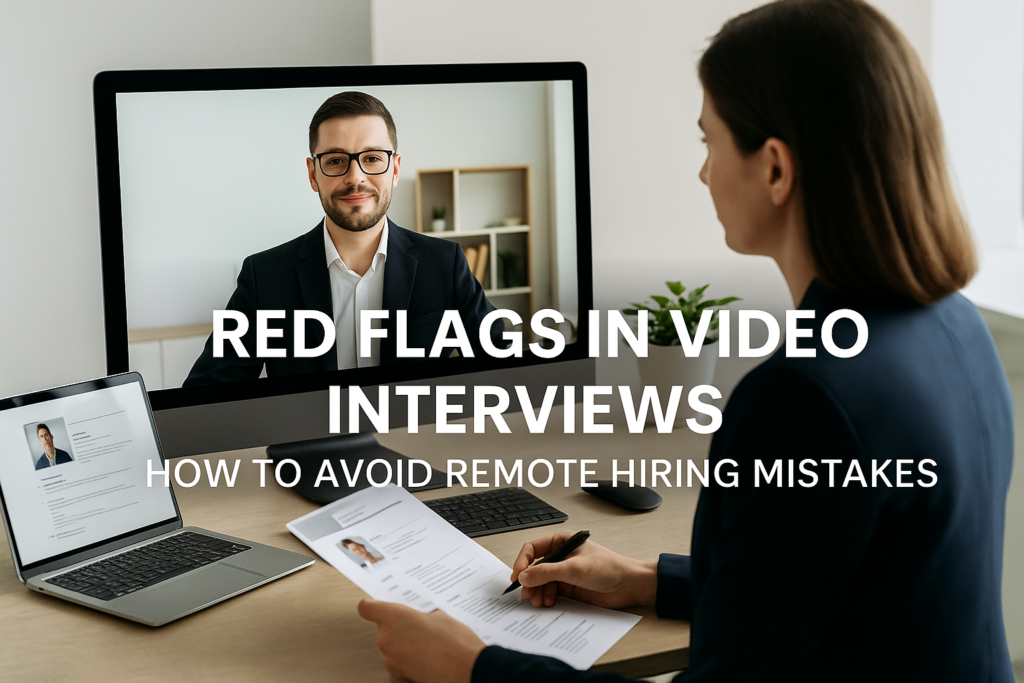Red Flags in Video Interviews: How to Avoid Remote Hiring Mistakes
Introduction
Video interviews are now a staple in modern recruitment, especially for remote hiring. But they come with a unique challenge: how can you spot red flags in video interviews when you can’t read all the in-person cues?
Hiring the wrong candidate remotely can result in high turnover, lost time, and lowered team morale. This article will help recruiters and hiring managers avoid common remote hiring mistakes by identifying early warning signs before making the offer.
Looking to improve your hiring strategy for remote teams? Check out our guide to building high-retention distributed teams.
1. Lack of Preparation or Research
One of the most immediate red flags is a candidate who shows up to the interview without a clear understanding of your company, the role, or even your industry. In a video interview, this can be identified through:
- Vague or generic answers.
- Not knowing your company’s core services or mission.
- Struggling to articulate why they applied.
💡 Tip for recruiters: Ask open-ended questions like “What attracted you to this position?” or “How do you see yourself contributing to our team?” Watch for depth in their responses.
2. Poor Communication Skills
Effective communication is non-negotiable, especially for remote roles. If a candidate struggles to express themselves clearly, frequently interrupts, or speaks in circles, it may signal deeper challenges, not just nervousness.
Look out for:
- Over-reliance on filler words.
- Difficulty answering questions concisely.
- Avoiding eye contact (even virtually).
📌 While nerves are natural, consistent communication issues could hinder collaboration within a distributed team.
3. Blaming or Negative Talk About Previous Employers
One of the most telling signs of a potential misfit is how a candidate speaks about their past. If they spend excessive time complaining about previous jobs, managers, or coworkers, it may indicate a lack of accountability or professionalism.
Watch for:
- One-sided blame.
- Statements that lack self-reflection.
- Vague references to “toxic environments” without detail.
🧠 Pro insight: Ask how they’ve handled challenges at work. Strong candidates will focus on solutions, not just problems.
4. Distractions and Unprofessional Setup
A chaotic interview environment doesn’t always mean the candidate is unqualified, but repeated or preventable distractions can show a lack of respect for the interview process.
Warning signs include:
- Interviewing in a noisy or public place.
- Constantly checking their phone.
- Technical issues that haven’t been addressed beforehand.
🔍 Remember: You’re not expecting a perfect studio setup, but how someone prepares their environment can reflect how seriously they take the opportunity.
5. Evasive Answers or Overly Scripted Responses
Candidates who can’t provide clear examples or consistently avoid specifics may be hiding a lack of experience — or worse, misrepresenting themselves.
On the other hand, those with overly polished, robotic answers may be relying on rehearsed scripts rather than genuine understanding.
Try asking:
- “Tell me about a time you failed and how you responded.”
- “What would your previous manager say is an area for improvement?”
You’re looking for authenticity and self-awareness.
6. Inconsistent Career History or Gaps Without Clarity
Job-hopping, unexplained gaps, or sudden career changes aren’t always red flags — but they become concerning if the candidate can’t explain them confidently.
Ask:
- “Can you walk me through this career transition?”
- “What were you doing during this period?”
Their answers should provide reasonable context without being defensive or vague.
7. Overpromising or Unrealistic Expectations
If a candidate claims to be able to “do everything” or has excessively high compensation expectations for an entry-level role, it could indicate a lack of self-awareness or unrealistic ambitions.
Pay attention if they:
- Avoid giving salary expectations.
- Promise fast results without understanding your business.
- Display an inflated sense of confidence that isn’t backed by examples.
Conclusion: Trust Your Instinct, But Validate with Evidence
Video interviews don’t need to feel limiting. By focusing on verbal cues, consistency, and preparation, you can identify subtle signs that help you avoid bad hires and move forward with confidence. Especially in fast-moving environments — startups, remote-first companies, or those hiring from new regions like Eastern Europe — fine-tuning your ability to spot red flags can save time, money, and team morale.
🎯 Need help finding pre-vetted remote talent with 90% retention? Discover how Advantcode matches you with top Balkan professionals.

